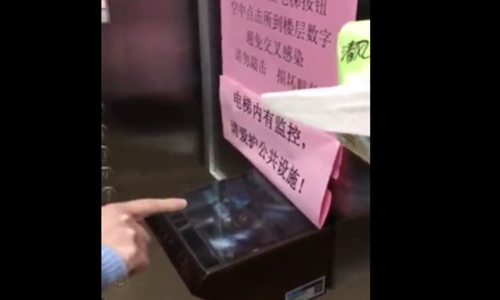
Screen shot from the video
A “no-touch” holographic terminal displaying elevator buttons was recently put into use in Hefei, East China’s Anhui Province. By tapping the screen projected in the air via interactive holographic display technology, elevator users can choose which floor they want to go to without physically touching the buttons.
While some netizens applaud the idea of using high-tech normally seen in science fiction movies to avoid cross-infection amid the COVID-19 epidemic, some question the practicability and cost of the device as each unit reportedly costs about 15,000 yuan ($2,156).
“It is impractical and too expensive. Once the epidemic is over, it won’t be used anymore,” one Sina Weibo user commented.
“Voice control is more suitable and convenient, as it can be used both during the epidemic and in the long run,” another wrote.
Zhu Yongzhi, vice president of the Hefei-based company that produces the no-touch devices, told the Global Times that the accuracy of voice control varies to some extent depending on environment, and the languages and dialects the users speak.
He said that the company may make slight adjustments on the price of the device after mass production, depending on future upgrades and user experiences.
The device, with the response time of less than 30 milliseconds, can be docked with all existing elevator systems without disturbance or negative impact.
It is already being piloted in some local institutions including hospitals and office buildings. Zhu said the company has accepted orders from Shanghai, Beijing, and Hangzhou in East China’s Zhejiang Province.
“People’s awareness of health and sanitation has improved during the coronavirus epidemic,” Zhu said, optimistic about the device’s market potential.
Chinese companies have been making innovations to address the COVID-19 cross-infection risk posed by elevator buttons.
A Shanghai-based elevator company developed a voice control device in February to help reduce cross infection from skin contact with elevators. The device was installed in a hospital at Yichang in virus epicenter Hubei Province, and was later also installed in the Beijing Xiaotangshan Hospital.
The cost of the device is around 4,000 yuan, though that is expected to be reduced to 1,000 yuan following mass production, according to media reports.
China's high-tech giant Huawei has also developed a no-touch approach that allows users to use a mobile phone app, WeChat or Bluetooth to call elevators and select levels.
“The coronavirus has spurred innovation,” a netizen wrote.
Ordinary Chinese people are also innovating to avoid cross infection in elevators by utilizing various tools including toothpicks, tissue paper, pens, keys, gloves, mobile phones and lighters.
Global Times
